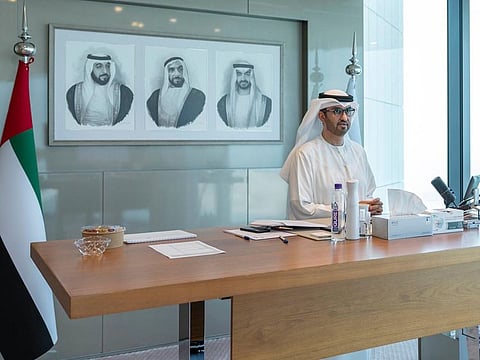'Made in The Emirates' seal to be introduced later for UAE's 'Operation 300bn': Dr Sultan Al Jaber
UAE's industrial initiative will see major updates to regulations, says Minister

Dubai: A special ‘Made in The Emirates’ seal will be introduced as part of the UAE’s hugely ambitious ‘Operation 300Bn’ industrial sector reforms launched last month.
“The seal… is one of our key initiatives we plan on launching at a later time,” said Dr. Sultan bin Ahmed Al Jaber, UAE Minister for Industry and Advanced Technology. “This will be a quality mark that supports national products and services.
“The brand will seek to become a symbol for best-in-class. The ‘Made in The Emirates’ seal will stand as a representation of pride in the superior-quality products and world-class industrial base the Emirates has given rise to.”
Aim for 300
The UAE expects its industrial sector to develop from its current Dh133 billion size to Dh300 billion by 2031, through the initiatives created from Operation 300Bn. As many as 13,500 industrial-focussed SMEs will be covered by the programme. "In formulating the strategy, alongside the local and international bench-marking, we engaged more than 200 private and public sector entities across the UAE, held over 40 workshops and conducted more than 10 specialized surveys to ensure that we are being both practical and aspirational in our approach," said Dr. Al Jaber.
Seal of approval – and of hope
As and when it is introduced, the seal will provide more than a marker for the UAE’s full-on makeover of its industrial sector, which aims to support SMEs as much as the big industrial ventures. Market sources reckon that investment zones such as Kizad in Abu Dhabi and Dubai’s Industrial City and other free zones will be the immediate beneficiaries of the 300Bn programme.
Even before the announcement, sectors such as agriculture, food processing, downstream activity in petrochemicals and other categories had seen significant increases in investment flows during 2020. In fact, anything to do with agritech is gaining support from both government entities and private funds.
And in January, Emirates Global Aluminium shipped out the first aluminum products made using solar energy sources. One of the first clients was a BMW Group plant in Germany.
More recently, there was confirmation of COVID-19 vaccines being produced in-country – and representing the biggest leap yet for the UAE’s growing pharmaceutical base. Contract manufacturing of more such key medicines are on the way.
According to Dr. Al Jaber, the UAE already has in place the building blocks. The next logical step with Operation 300Bn is to widen it further. Obviously, there will be changes to the regulations as well.
“Having the right regulatory framework in place is a critical enabler of this strategy,” the Minister said. A “robust regulatory structure will be critical and includes updating the existing law that regulates industry, to ensure doing business in the UAE is easier… and quicker.
“We are developing and applying internationally recognized standards to boost the competitiveness of locally manufactured products for global export markets.”
Priority push
There are 11 sectors deemed as of vital importance in the new scheme of things. These include medical supplies, space technology, sustainable products and renewable energy, chemicals, metals, advanced technology manufacturing, pharmaceuticals and food and beverage. “We are not limiting ourselves and will continue to identify more sectors as we progress,” said Dr. Al Jaber.
“We’ve seen some remarkable success stories emerge from the UAE’s industrial ecosystem in recent years. And we expect that the strategy we have put forth will combine to produce many more. The core of our strategy is based on the adoption of advanced technology, which functions as a critical enabler to achieve operational efficiencies, enhance flexibility and agility of production lines, job creation and amplify the output of every employee."
Licensing ways
The Minister said industrial licenses continue to be “issued without disruption”. “We will also gradually introduce additional data fields from licensing applications to improve the availability of industrial data across the UAE, which will help our stakeholders better understand their markets.”
It will be interesting to see whether existing industrial-focussed ventures need to make any changes to be part of the 300Bn’s new framework, whether on the regulatory side or for licensing purposes.
“Among recommendations and initiatives outlined in the strategy, we highlighted three specific target industrial areas for growth,” said Dr. Al Jaber. “The first involves expanding and extending industries where we have competitive advantages in.
“The second comprises strategic industries that will reinforce our resilience and lessen dependence on global supply chains. And the third area focuses on cultivating a culture of innovation in industries of the future – in sectors that are powered by 4IR (Fourth Industrial Revolution) technologies.
“Make it in the Emirates is an open call to investors, innovators and developers to set up operations in the UAE and benefit from the attractive fundamentals that make it one of the best places in the world to run a business.”
Sign up for the Daily Briefing
Get the latest news and updates straight to your inbox








